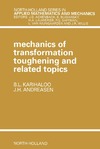Since the benefit of stress-induced tetragonal to monoclinic phase transformation of confined tetragonal zirconia particles was first recognized in 1975, the phenomenon has been widely studied and exploited in the development of a new class of materials known as transformation toughened ceramics (TTC). In all materials belonging to this class, the microstructure is so controlled that the tetragonal to monoclinic transformation is induced as a result of a high applied stress field rather than as a result of cooling the material below the martensitic start temperature.
The significance of microstructure to the enhancement of thermomechanical properties of TTC is now well understood, as are the mechanisms that contribute beneficially to their fracture toughness. The micromechanics of these mechanisms have been extensively studied and are therefore presented here in a cogent manner.
The authors also review dislocation formalism for the modelling of cracks and Eshelby's technique. In compiling this monograph the authors present the most up-to-date and complete review of the field and include several topics which have only recently been fully investigated.
 |
|
О проекте
|
|
О проекте


